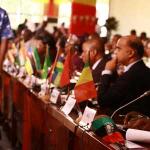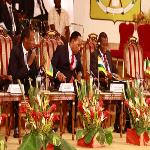ADEA Executive Secretary Ahlin Byll-Cataria said there's a missing link between education and employment in Africa. He said students finish primary school without job skills and college graduates have diplomas, but no opportunities for work.
The answer, he said, is to make Africa's education and training systems more flexible, and capable of encouraging life-long learning. He adds they also need to emphasize improving vocational and technical training for those who do not continue to secondary school.
These and other ideas have been researched and analyzed by ADEA sponsored groups. Delegates at this week's Triennial, or three-year meeting, will discuss their findings. The goal is to come up with ideas for creating improved educational and training systems that will promote for economic growth.
Byll-Cataria said that means creating curricula that fit the needs of local business and potential investors.
He said this is already happening in some member countries of ADEA:
"[In Tunisia], he said, "there is now more cooperation between the job market, different companies and the training schools. For example, where they have to train engineers, there is a lot of discussion between schools and the companies in order to [learn] the demands of the company, to take them into account in the curricula and even in the management of the schools. That's what exactly we want to promote during this Triennial [meeting]."
Likewise, he said, in Mali, an association of artisans is working to improve the skills of mechanics, carpenters and tradesmen needed by local companies. The association has also helped workers and companies to win government contracts.
Also in West Africa, several nations are working together to develop a network of trade and vocational schools based in part on a successful model developed by Nigeria.
Improved Standards
Byll-Cataria said educators are working to integrate government-run, or formal, school systems with other groups that are helping to educate students. Among them are NGO's, community literacy centers, and faith-based groups, including Islamic schools that are expanding their curricula.
 Over 600 representatives from government, business, labor, youth and non-governmental organizations were expected to attend the ADEA conference.
Over 600 representatives from government, business, labor, youth and non-governmental organizations were expected to attend the ADEA conference. Byll-Cataria said the goal is to ensure quality and standards so students educated by the groups are ready to enter the formal school system if they wish.
"You have a lot of madrassa teachers willing to modernize it, to add access to basic education, learn to read and write, and learn science," he said. "If we consider that you have a lot of children in the Sahellian countries whose first experience with education is through madrasas, then it's very important we help them improve the quality of their teaching and extend their teaching from the Koran to other disciplines."
Education for Peace
Delegates meeting in Burkina Faso will also look at the success of peace education. It's part of a curriculum developed by Kenya. It focuses on peace-building as does an ADEA group including nearly a dozen post-conflict nations, including Rwanda, Somalia, Ivory Coast, Sierra Leone and Liberia.
"How did Kenya become the leader?," asks Byll-Cataria. "Recently after trouble Kenya had after elections [late 2007], the Ministry of Education wanted to keep schools out of violence, so they created a program and approach to make sure children who are going to school remain there and are not involved in violence. In 2009, they had a conference with 11 post conflict countries to share their experience."
He said he expects other countries to join the group.
"By attending the Triennial," he said, "South Sudan could benefit from our analytical work on early childhood development, literacy, non-formal education, books and learning materials, and higher education. We have nine working groups who tackle the issues related to education and training in Africa. I'm sure the delegation of South Sudan could benefit from that."
Overseas support
Delegates to the ADEA conference will also look abroad for help in modernizing African education systems.
Byll-Cataria said the meeting has invited officials from the Republic of Korea to address the delegates:
"We know in 1945, Korea was a very poor country, colonized and occupied with nearly 70 percent illiterate and people were hungry," he said. "But Korea invested in education, training and research and is today among the 10 largest economies in world."

Kofi Asare
Over 90 percent of all school-aged children in Ghana attend primary school.He says Korean academics and officials will share lessons on how they mastered core skills for primary and early childhood education, as well as technical and vocational skills for older workers.
ADEA is also drawing upon the skills of Africa's diaspora through modern technology.
"Someone from Burkina Faso but living in the US who wants to contribute to the development of the country can do it and stay in Washington but using new technology," said Byll-Cataria. "A professor could be teaching in Ouagadougou by videoconference or a medical doctor could partner with a medical doctor in Burkina Faso in telemedicine."
ADEA describes itself as a policy forum made up of 43 African ministers of education and nearly two dozen development organizations. It works to improve the quality and effectiveness of education through the sharing of ideas and experiences.
Development specialists say success in the global economy depends on a flexible knowledge and skills base. They say this, when added to the Africa's natural resources and high numbers of young people, could make African economies among the world's most dynamic and productive.
